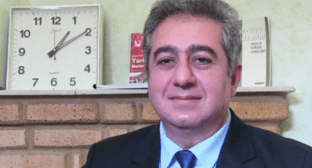12 January 2009, 23:00
Russia's UFSIN: radical Islam grows popular in prisons of Kabardino-Balkaria
Ahmed Abidov, head of the Russian Corrective Administration (the so-called "UFSIN") for Kabardino-Balkaria, said in his speech at the parliamentary session that spread of religious extremism in the region as a whole and in prisons, in particular, is one of the most acute problems.
According to his story, his department takes a number of preventive steps to eliminate the problem. "Within our interaction with religious officials we have signed cooperation agreements with the Spiritual Department of Moslems and Russian Orthodox Church. The territory of the Corrective Colony No. 1 now houses an Orthodox temple and a Muslim mosque, other establishments have praying rooms, where convicts can exercise their religious practices," said Mr Abidov. In the opinion of the speaker, these measures can influence the religious orientation of convicts.
Besides, the prisons now have properly equipped rooms of psychological relaxation and computer classes connected to the Internet. The number of prisoners who receive their professional training has gone up.
Speaking about the problems, Ahmed Abidov has noted that the recent years witness a growth in the number of convicts for grave and especially grave crimes. Such crimes were committed by more than 50 percent of all convicts. Every eighth of them was convicted for illegal drug dealing, and every fourth one was trialled for two and more times. "We see the trend towards younger convicts," the head of the Republic's UFSIN said.
The problem of convicts' employment is still pressing. Absence of orders does not allow to properly loading the production capacities. Mr Abidov addressed the deputies with a request to exempt the units of the corrective system of the Republic from payment of profit taxes to the national and local budgets. The money could go to creation of additional jobs for the convicts.
"The tuberculosis morbidity has dropped in prisons and colonies," said Ahmed Abidov, "by 12.5 percent." In his opinion, this is a result of better medical service and complex application of new generation anti-tubercular preparations. However, the increase of HIV-infected inmates made 20 percent since 2006.
Ahmed Abidov has also reported that in March 2008 the investigatory isolation facility (SIZO) was visited by a delegation of the European Committee against Torture, which highly assessed the custody conditions of inmates there.
Author: Luiza Orazaeva Source: CK correspondent




